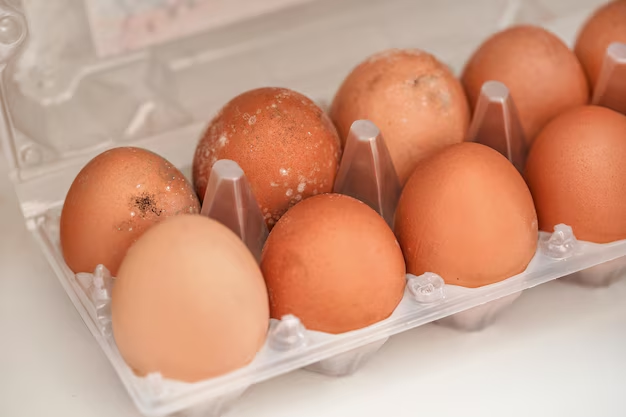How Long Do Eggs Really Last in the Refrigerator? 🥚
Imagine opening your fridge, pulling out that carton of eggs, and hesitating. Are they still fresh? Should you risk making that omelet? These questions might sound familiar because understanding the shelf life of eggs is vital for any home cook. Not only does it ensure quality meals, but it also keeps your family safe from potential foodborne illnesses. Let's crack open the topic of egg storage and discover how long these versatile ingredients last in your refrigerator.
The Basics of Egg Shelf Life
Eggs are a staple in many households due to their nutritional benefits and versatility in cooking. However, unlike nonperishable foods, eggs do have an expiration date. Typically, fresh eggs stored in their cartons can last about 3 to 5 weeks in the refrigerator. This timeframe, however, is affected by several factors.
Factors Influencing Egg Freshness
Refrigeration Temperature: Keeping your fridge at a steady temperature below 40°F (4°C) is critical. This helps slow down bacterial growth and preserves egg quality.
Humidity Levels: Eggs are best stored in a slightly humid environment but not too humid. Humidity levels can extend or shorten the shelf life, depending on how well you manage them.
Quality at Purchase: Fresher eggs will naturally last longer than those approaching their sell-by date when purchased.
Eggshell and Packaging: Intact shells are essential to shield the egg from bacteria. Hence, avoid using eggs with cracked shells.
Proper Egg Storage Techniques
Storing Eggs in Their Original Carton
One of the simplest yet most effective storage methods is to keep eggs in their original carton. Cartons protect eggs from absorbing strong odors and flavors from other foods in the fridge. They also prevent moisture loss and, most importantly, light exposure, which can degrade the quality of eggs.
Egg Placement in the Fridge
Although many refrigerators feature built-in egg compartments on the door, it's best to store eggs on one of the interior shelves. The temperature is more consistent inside the main body of the fridge, contributing to longer shelf life.
Keep Track of Dates
While eggs do have a long fridge life, it's wise to monitor their freshness:
- Sell-by Date: This date is not the "use by" date. Eggs can often be good for a few weeks beyond this with proper storage.
- Purchase Date: If you buy from a farm, record the date on the carton yourself.
Identifying Spoiled Eggs
Having stored your eggs correctly, the next part is recognizing when they might be past their prime.
The Float Test
One popular at-home test to check egg freshness is the float test. Fill a bowl with water and gently place an egg into it. Fresh eggs will sink, while older eggs will float. This is due to the increasing size of the air cell inside the egg as moisture and carbon dioxide seep out over time.
Appearance and Smell
- Crack the Egg: If you're unsure, try the smell test. A fresh egg should have little to no smell. Any sulfur-like odor is a clear sign of spoilage.
- Visual Signs: Look for strange colors or odd textures in both the yolk and white once cracked.
Using Your Senses
Remember, trust your senses. If something smells off, it likely is. Discard any eggs that seem suspicious.
Beyond Freshness: Egg Safety and Usage
Cooking with Older Eggs
Older eggs can still be safe for consumption if they pass the smell and float tests; however, they work better in certain dishes. Scrambled eggs or quiches can be ideal cooking methods as the eggs will be fully cooked, reducing the risk of any potential bacterial presence.
Raw or Undercooked Eggs
For recipes requiring raw or lightly cooked eggs (like homemade mayonnaise or Caesar dressing), ensure you only use the freshest eggs. Consider pasteurized eggs for these purposes to minimize health risks.
Nutritional Value
While eggs remain safe to eat for a few weeks, their nutritional content might degrade slightly over time. Consuming fresh eggs ensures you're getting the maximum nutritional benefits.
Key Takeaways for Storing Eggs
Maintaining egg freshness is mostly a matter of proper storage and routine checks. Here's a handy list to guide you:
- 🥚 Keep eggs in their original carton for protection.
- ❄️ Store eggs on the main fridge shelves, not the door, to maintain consistent temperatures.
- 📅 Check dates regularly—and know that eggs often outlast the sell-by date.
- 💧 Perform the float test for a quick freshness check.
- 👃 Use the smell test for any doubts about their safety.
- 🍳 Cook thoroughly to ensure safety, especially with older eggs.
Ensuring your eggs are stored correctly and knowing when to discard them can help you enjoy their benefits while avoiding any culinary missteps.
Bringing the Egg Story Together
Understanding how long eggs last in the refrigerator isn't just about keeping your meals tasty—it's about ensuring safety, minimizing waste, and maintaining the nutritional integrity of your food. Eggs are a powerhouse ingredient that, with just a bit of knowledge and care, will serve as the cornerstone of countless meals.
Egg storage isn't a complicated science, but it's definitely an art worth mastering in any kitchen. By implementing these strategies, you can extend the life of your eggs and ensure that every omelet, cake, or frittata is as delicious as it is safe.

